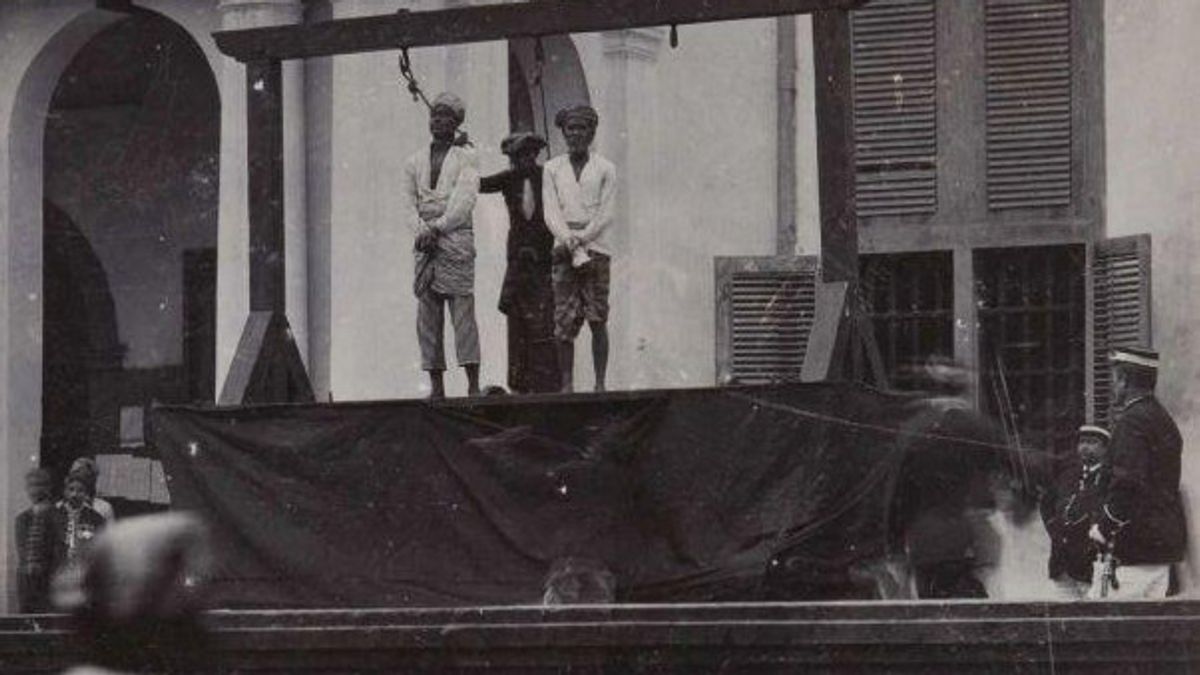JAKARTA - Traces of adultery of men or actors have been present since the time of the Dutch trade partnership, the VOC. The VOC, through the Council of the Church applied strict rules to non-European adulterers. Pelakor is even likened to a snapper-class villain. The punishment for the decorator is so cruel. The colonial government in Nusantara acted as an invader as well as a moral policeman. It's a matter of lust, one of them.
Since the conquest of Jayakarta – then Batavia – by the VOC of 1619, the Dutch colonial government began to reform. In addition to the improvement in terms of natural resource monopoly, the Governor-General of the VOC who had served twice (1619-1623 and 1627-1629) Jan Pieterszoon Coen helped fix the moral problems of Europeans (Dutch) in the colony.
The goal was for all manner of voc officials' behavior that did not conform to church norms -- drunkenness and adultery -- to be eradicated. Europeans were charged with being an example for a more dignified life in the Colony.
The Batavia Church Council also played a lot of roles. They supervise, rebuke, prohibit, and punish if any official commits a violation of norms. Dutch historian Hendrik E. Niemeijer reveals, many violations, the most common cases of sexual misconduct.
In 1672 alone, cases of sexual misconduct committed by men reached 90 cases. While women reached 204 cases. A total of 294 cases of sexual misconduct topped the list of Church Council violations, compared to societal, domestic, and ecclesiastical cases.
"In our source, which is a book of minutes of church council meetings, sexual misconduct is commonly written: The practice of prostitutes, fornication, and abuse and infidelity. It is interesting to note that half of the sexual offences involved male and female slaves, or those with Asian names. The other half involves people with the name of the mardiker," said Hendrik E. Niemeijer in the book Batavia Colonial Society xvii century (2012).

However, the number of those who are native to the Netherlands is very small, about 10 percent only. The Church council seems to have highlighted much of the issue of sexual misconduct among mardiker citizens and slaves. While Europe is also doing the same it is not too much of a concern.
The unfair behavior was evident in the punishment given. If sexual offenses are committed by those of slaves or mardjikers --freed slaves, severe punishment awaits. It's different from the Dutch. They get a lot of exceptions.
Even if the Council of the Church dares to punish Europeans who have committed sexual offences, they will make decisions carefully. At least a careful decision that makes the person concerned do not lose face or not be gossiped in the future.
"Outside Batavia the implementation of discipline was more difficult because the number of Europeans was small. Also the possibilities of the priest to impose a law of scheme are limited because he depends on the local VOC officers. Sometimes it is heard about a priest who was imprisoned or fired (by the VOC) for daring to reprimand a VOC officer," Christiaan de Jonge wrote in the book What is Calvinism? (1998).
Punishment of the decorators
The legal evidence of the Council of the Dutch Church was present in the case of a Dutchman named Maria Harmste. Maria was then charged with adultery by bringing a lover into her home.
The Council of the Church then acted cautiously. Before the indictment, the Geraja Council gathered evidence from Mary's neighbors. Nevertheless, in Maria's defense, he filed a rekes (application) and asked to be shown evidence of who made the allegations.
The church council refused to show evidence so Mary's path was free from accusations of being a decorator. Different treatment is obtained by those who are not European. Catrina Casembroot and those of Asian descent in 1639 became real examples.
Catrina was the widow of the late Nicolaes Casembroot, a batavian mardijker merchant. Catrina is accused of adultery with several men. In the indictment, Catrina is considered to have committed sexual offences, both when her husband was alive and after she died. Even worse, when catrina is accused of stealing by using the daughters of her slaves.

"In addition, Catrina is also accused of using magic, jampi-jampi, and drink potions to force the men to fulfill her sexual desires. In fact, he was also accused of being the brains of evil by ordering, permitting, agreeing to poison others. One of the victims was Jan Scholten, a barber in Batavia. Jan's life was ultimately spared. It's life-threatening. The other victims were a Dutch woman, Grietgen Barthomoleus, wife of Andries Cramers, courier of the city's Legislative Council. Despite ingesting the poison given on Catrina's orders, her fate is safe," added Achmad Sunjayadi in the book [Bukan] Tabu di Nusantara (2018).
It's not just Catrina. An indigenous woman, Annika da Silva who was also the wife of VOC soldier Leendert Jacobs was convicted of being a decorator. She is accused of adultery with several men while her husband was still alive. Moreover, Annika seemed to force the men to have sex with spells and drink pekasih. Moreover, Annika is accused of trying to poison her own husband.
"In 1639 there was the execution of four women on charges of adultery and good use. Catrina Casembroot was immersed to death in a barrel filled with water. The young widow is accused of adultery both when her husband was alive and after his death. While three other women (including Annika da Silva) in court were decided to be tied to poles. Then one by one will be strangled to death. It was then stamped on their faces and confiscated all their possessions," concluded Alwi Shahab in the book Baghdad Merchants of Betawi (2004).
*Read more information about SEJARAH NUSANTARA or read other interesting writings from Detha Arya Tifada.
Other MEMORY
The English, Chinese, Japanese, Arabic, and French versions are automatically generated by the AI. So there may still be inaccuracies in translating, please always see Indonesian as our main language. (system supported by DigitalSiber.id)









